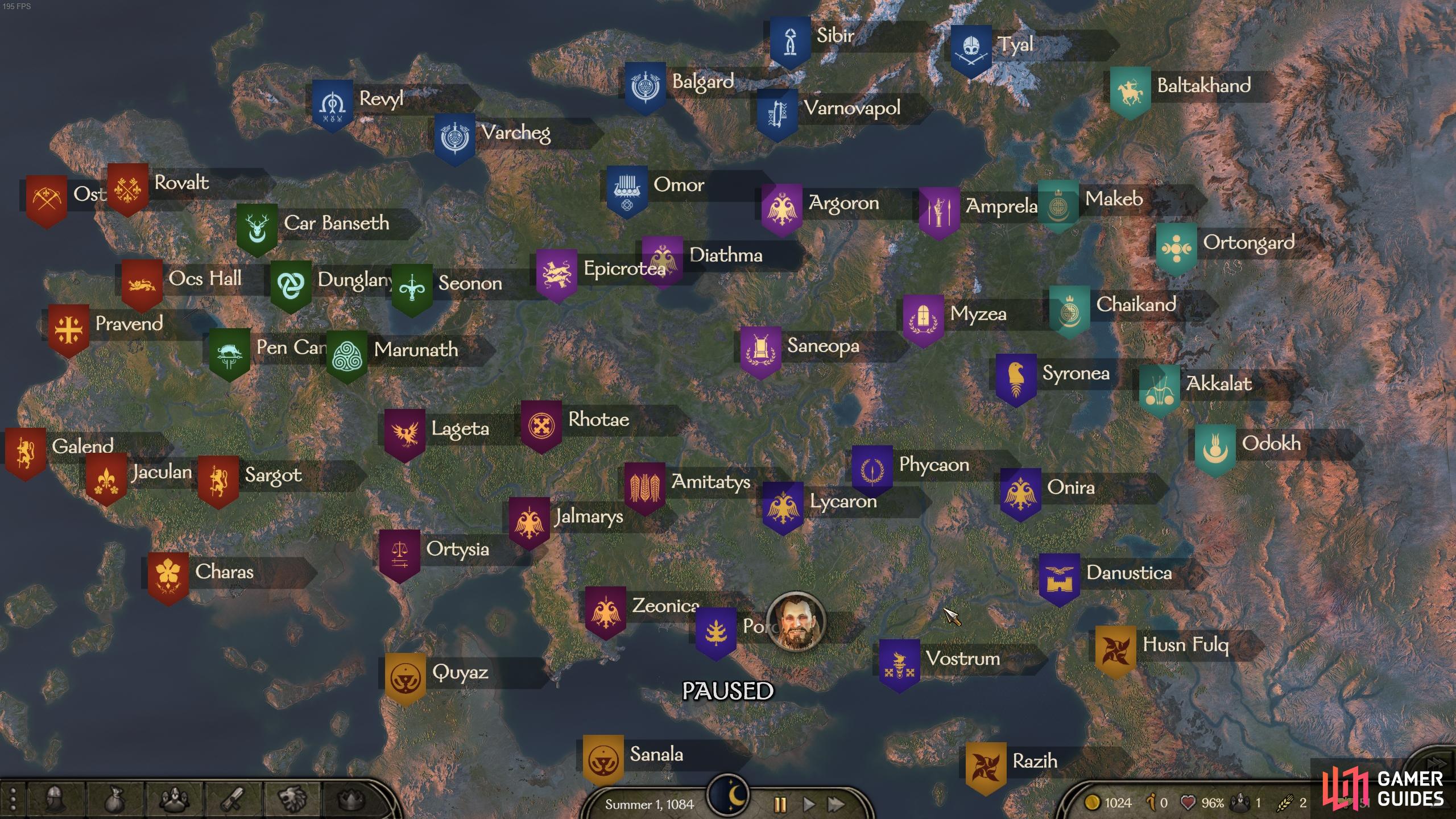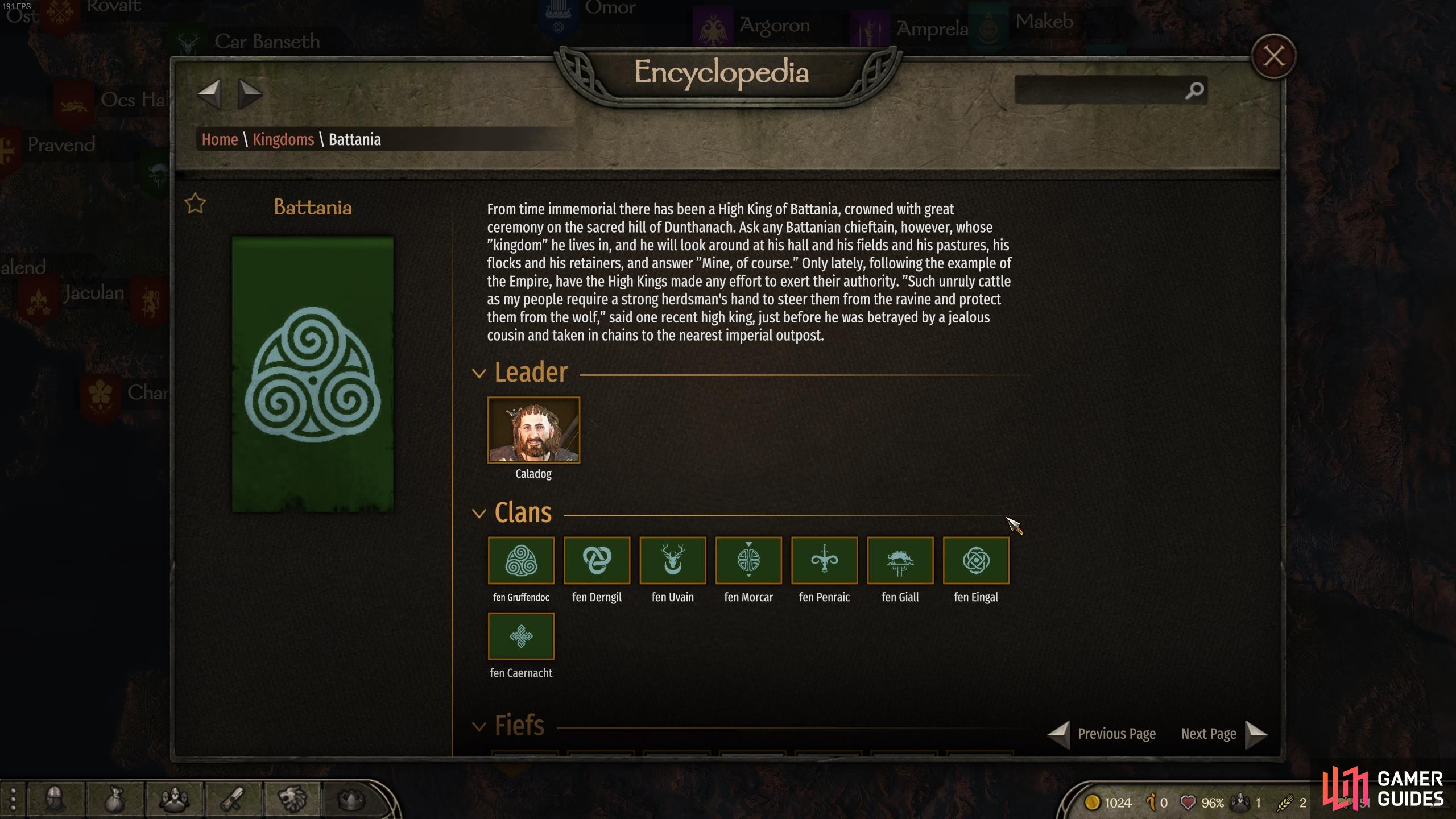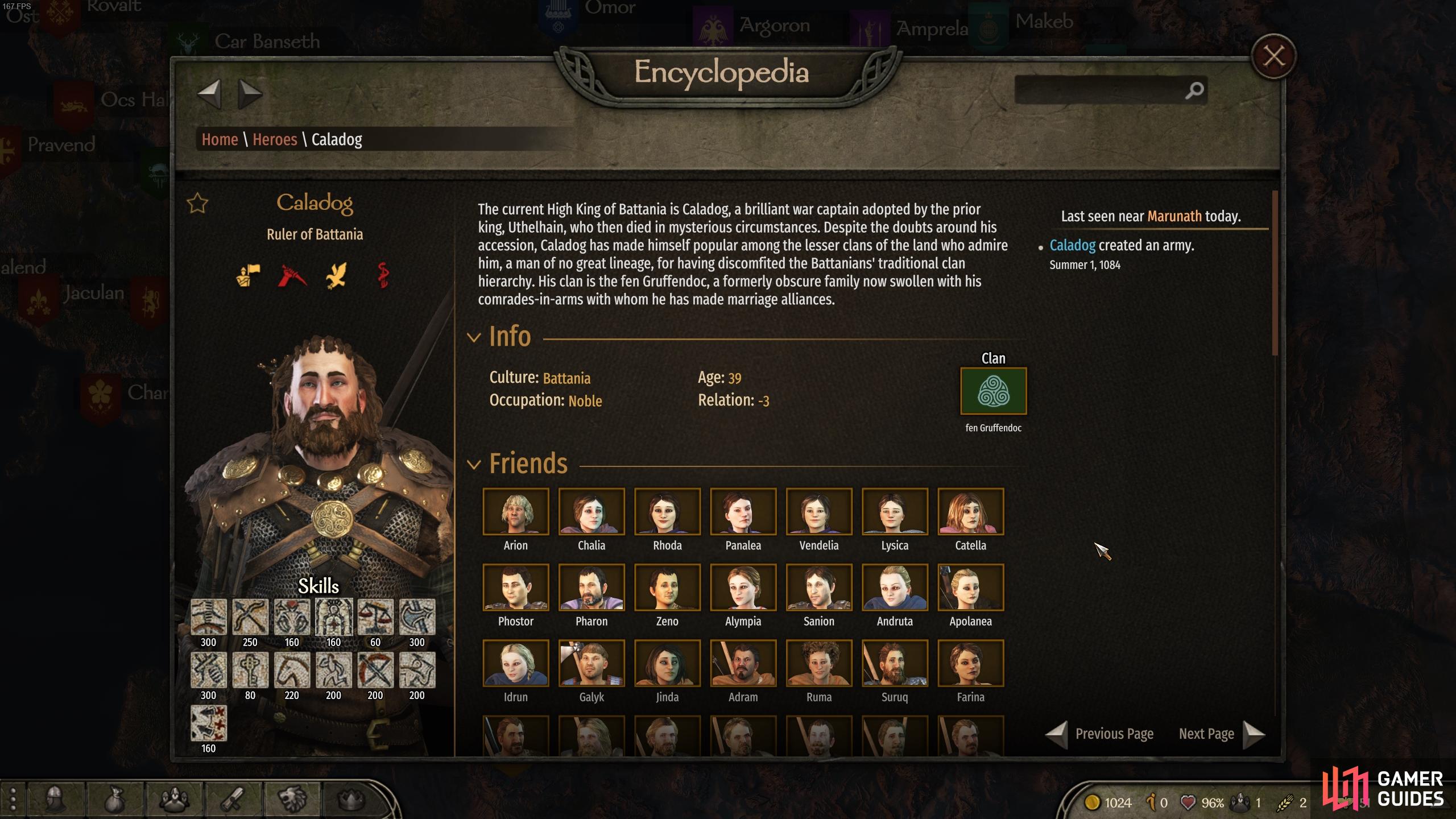In Mount & Blade: Bannerlord there are a number of familiar concepts which carry over from older versions of the game, such as the original and Warband. The basic principles of forming a group of adventurers comprised of companions and different types of units remains the same, with the potential to grow into the size of large armies. These are known as Parties in Bannerlord. You’ll also see the terms Clan and Kingdom being used to refer to different groups throughout Calradia. On this page we’ll define what each term means in the context of the game, and what you can do as a Party, Clan, or Kingdom.
Parties in Bannerlord¶
Improving Your Party - Renown, Influence, Combat¶
The basic concept of the party is introduced in the game as soon as you’ve finished the tutorial. You’ll find yourself placed on a specific region of the map depending on what culture you chose as the background for your character. At this point you’ll be all alone, without a friend in sight. Now begins the task of growing your party and building its strength. In the beginning you’ll most likely only have enough funds to purchase a few basic units, which can help you to win small battles and slowly improve your Renown, Influence, and Combat experience. The initial focus of increasing the strength of your party will be done by levelling up the small bands of units that you hire, but also improving your own skills in specific combat types such as One-Handed, Two-Handed, Polearm, Archery, Crossbow, and Throwing.
Recruiting Party Companions¶
As your party grows and becomes more powerful (and as you acquire more funds in various ways as described here), you’ll eventually be able to hire more powerful units known as Companions. These will serve not only as capable warriors in your party, but they will also have specific roles which will improve the efficiency of your party in various ways. The roles of your companions will expand as you begin to take control of your own land and settlements, at which point you’ll be able to assign specific companions to roles such as Governor. You will also need competent Party Leaders, who you can send out to build a party of their own and reinforce your strength at settlements or tactical positions in times of need, and Caravan Leaders, who are important in terms of keeping your trade caravans safe and running smoothly.
Party Food¶
The three most important factors that you’ll need to keep an eye on when controlling a party are its food consumption rate, troop morale, and wages required to keep them in action. All three of these factors are linked together: if you fail to provide food for your companions and units and / or if you fail to pay them, their morale will begin to decline drastically. A low level of morale will lead to desertion, but it can also cause some of your companions and troops to become ill and suffer from attrition. All you need to do to ensure that your party is adequately fed is keep food items in your inventory. You can’t choose what your party members eat at specific times. Instead, the food stores will gradually deplete with each passing day.
There are a number of things to keep in mind when purchasing food items for your party, including the cost, type, and overall variety. The cost is among the most important: you’ll want to keep moving between settlements to find the best prices on food items, as the same food item may be cheaper in one settlement and more expensive in another. The type of food is important because some food items will provide more sustenance than others, allowing your party to maintain its strength for a longer period of time. This can be particularly important during sieges. Finally, variety is important because this will provide a boost to the party morale, so be sure to stock up on different types of meat, vegetables, milks, jams, and more exotic foods whenever you can find them.
Party Morale¶
The morale of a party represents the confidence that its members have in their commander. You will be the commander of your own party at all times, but this is also important to consider for your companion party leaders when you eventually begin to set up different parties with leaders and units who are loyal to you. We’ve already discussed how the morale of a party can be influenced by the amount, type, and variety of food available, but it can also be affected by your personal skills, especially in Leadership, Charm, and Steward. In addition, you’ll find that specific events can impact the level of morale in your party, such as when you win or lose a battle. For the most part, these events will only have an immediate effect on party morale, rather than a prolonged one, but they can be useful sources of improving morale when it’s most needed, or in the worst case further depleting it if you lose a battle.
It’s important to maintain a high level of morale for your party at all times, as this will reduce desertion rates, increase the desire of your troops to keep fighting against the odds, improve army cohesion, and even influence the speed at which you can travel on the map if your party scout has the relevant perks.
Party Wages¶
As with food, wages and your ability to consistently pay them to your companions and troops are also tied to the overall level of morale that your party will experience. However, there are few complicating factors when it comes to paying your party. The main thing to understand is that higher level and more experienced troops will cost you more, and low level troops will cost you less. A low level troop generally starts at around 5 denars per week (7 days in game), while a higher level troop will generally cost you 12 denars per week. The highest level elite troops will eventually cost you 17 denars per week. Once you have a party that consists of thousands of troops, all of this adds up and you’ll quickly find that paying your party wages is the most expensive thing in the game, aside from one-off purchases for thins like caravans or workshops.
If you fail to pay the wages for your companions and troops, they’ll quickly lose morale as you incur debt, and will eventually abandon you if you don’t rectify the issue as soon as possible. Paying the wages of your party should always be among your highest priorities, and you should never expand your clan or kingdom unless you feel confident that you can continue to pay for your party as you do so. If you want to work on reducing the cost of wages for your troops, the Steward skill perks are particularly useful for this. They also provide options to reduce the impact of morale degradation from single types of food, and to reduce food consumption in specific scenarios, such as when you’re under siege.
Clans in Bannerlord¶
The clan is an entity in Bannerlord that can essentially be understood as a family unit with loyal followers. Your own character is part of a small clan at the beginning of the game, as your brother reminds you. One of the first quests you’ll receive is called Rebuild Your Clan, which guides you in terms of the basic principles of what it takes to acquire new, loyal followers. The brother that you encounter at the beginning of the game will also ask you to find your siblings, which forms part of the Rescue Your Family quest. Ultimately though, if you want to build your clan and ensure its longevity, you’ll need to find a spouse to marry, and then have children who will continue your line of power. In Bannerlord, the character that you create at the beginning of the game will one day die, but your siblings or children can inherit the leadership role of your clan when you’re gone.
Aside from siblings, spouse, and children being a part of your clan, you can also adopt people from other clans. These people might be desirable to adopt due to their skills in combat, governance, or connections to other powerful figures. You’ll need to have good relations with anyone that you want to adopt, so it will take some time to gain their trust. You can also consider companions and troops as part of your clan, but without the more immediate familial ties that bind you to the others.
(1 of 4) You can zoom out on the map to see all the Kingdoms and their territories in Calradia.
Kingdoms in Bannerlord¶
In Bannerlord, a kingdom is essentially the most powerful type of political entity. If you have ambitions to influence the world of Calradia in any significant way, you’ll eventually need to form a kingdom to have the most autonomy over who, what, and how you govern. You will need a lot of resources, renown, and influence to manage a kingdom, so it’s not something you should necessarily consider doing early on in the game. Instead, you can first pledge yourself to an existing kingdom. As you serve as their vassal, you’ll get a feel for the political rivalries in the realm, and how to navigate them effectively. You can use this time to get to know different lords, ladies, and other notable figures as you decide who you might want to ally yourself with, and who you would take as your sworn enemies. Pledging yourself to a kingdom gives you access to most of the political intrigue, especially once you’re granted the status of being a lord or lady. This will allow you to become skilled in the ways of clan management, and improve your combat and political skills as you grow in strength and wealth.
If you don’t like the idea of starting your own kingdom, you can still wield a lot of power as one of the ruling noble clans in an existing kingdom. As a member of the kingdom council, you will have the ability to influence major decisions such as settlement construction, participation in war or peace treatises, passing new laws or deciding which clan leaders acquire control of specific settlements. If you become a definition yourself, it’s important that you listen to your own council of nobles to preserve the internal stability of your kingdom.





 Sign up
Sign up
No Comments